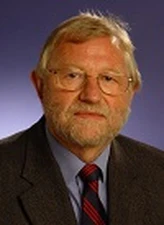Gerold Wefer

The 2011 Alfred Wegener Medal & Honorary Membership is awarded to Gerold Wefer for his pioneering contributions on the applicability of stable isotopes in marine calcareous organisms to reconstruction of the ocean history down to the seasonal scale and his exceptional devotion in serving the marine community.
The career of Gerold Wefer includes different facets, in all of which respects it reflects excellence. His fascination for the marine environment was initiated when he joined the scientific diving team at Kiel University during his studies in the early 1970s under the leadership of Eugen Seibold. After his graduation, PhD and habilitation in Kiel he became one of the founding professors at the Faculty of Geosciences at the University of Bremen (GeoB) in 1985, where he is still active as professor. Several visits to the Scripps Institute of Oceanography in Lajolla (California) in the early 1980s resulted in an exceptionally productive cooperation with Wolfgang Berger. Wefer’s main research interests cover vertical particle flux and productivity, isotopic palaeontology and marine microfossils and reconstruction of past ocean circulation using proxies. He has made fundamental and outstanding contributions in all of these topics. A major discovery was the demonstration of an extremely short-lived seasonal pulse of diatoms in Bransfield Strait, off the Antarctic Peninsula. The phenomenon of pulsed production of diatoms is of the utmost importance for the Cenozoic evolution of marine mammals and birds. Another pioneering achievement is his work on the applicability of stable isotopes in marine calcareous organisms as a monitor of environmental conditions down to the seasonal scale and their use for the reconstruction of ocean history. His scientific curiosity and vision are expressed in more than 200 publications, several books and special issues where he functioned as (co-) editor. He was (co-)chief scientists during 20 sea-going expeditions. Under his leadership GeoB has become one of the most productive and prominent marine institutes in Germany, Europe and beyond. As a result of his never-ending enthusiasm in pursuing new developments and techniques the Center for Marine Environmental Sciences (MARUM) and the DFG Research Center “The Ocean in the Earth System” have been hosted in Bremen since 1996 and 2001, respectively. The MARUM marine facilities cover the latest and most modern marine technologies and their developments. He also initiated and directs the European IODP core repository. The Bremen IODP sampling meetings are world famous also because of their unique brainstorming character offered to the participating scientists. Wefer’s open-minded attitude towards the excellence of science and the support of the younger generation is shown by his positive criticism with respect to the benefit and well-spending of financial and human resources. Besides his scientific achievements he is one of the pioneers who recognized the importance of communication to the non-scientific community long before it became fashionable. He is (co-) founder and initiator of the ‘Universum’ Museum and Science Center (with approx. 400.000 visitors per year), the City of Science Bremen and the House of Science Bremen. Various other activities in national and international science organizations witness his science-political engagement. Since 2006 Gerold Wefer has been chairman of ‘Science in Dialogue’, Germany’s centre of expertise for science communication, founded by the main German funding agencies and the German Government. Since a few years he has continued his unique efforts in bringing science to the outside world by enhancing communication among scientists of different disciplines, policy makers, industry, the press and the public.
Medal lecture video (Youtube) of the Alfred Wegener Medal given at the EGU General Assembly 2011.
